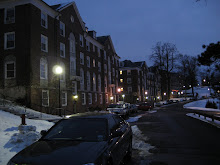 One of my greatest annoyances in today's world of environmentally-sensitive college students is the tendency for people my age to blame almost anything weather-related on global warming. Seemingly no climatic event can escape global warming's sinister influence.
One of my greatest annoyances in today's world of environmentally-sensitive college students is the tendency for people my age to blame almost anything weather-related on global warming. Seemingly no climatic event can escape global warming's sinister influence.Unseasonably-warm fall day? And to think, people say global warming isn't a problem. Big snow storm in January? Global warming causes extreme weather patterns! Endangered species? Global warming. Bad crop season? Global warming. Really cold winter day? Global warming.
For many such students, the horrible event of hurricane Katrina's landfall was simply fuel to the fire. All those displaced and devastated people would have been saved if we'd just stopped using fossil fuels, don't you see? ... Storms get stronger and more frequent because of global warming, didn't you know that? ... Just look how much stronger hurricanes are today - look how much more damage they're causing! ... and on and on.
I don't want to give the impression that I'm refuting global warming as an existing phenomenon. Clearly the earth is warmer now than it was in the recent past, and clearly human beings are putting things into the sky that cause the planet's temperature to increase. What remains to be seen, however, is whether we humans have had an impact equal to that of lighting a match in a building of several stories, or to, say, turning on the oven in your kitchen (see Coyote Blog for a better explanation).
Beyond any doubt, however, is the fact that strange weather patterns have existed as long as there has been weather. Pick any cold climate. Pick Vermont. Vermont has been having the occasional crazy-warm days in the middle of December for centuries, just as there have been temperatures on July nights that dip into the 40's. I have heard someone remark, aghast, at the powerful affects of global warming during the weirdly warm days every goddamn time. But, of course, no one mentions the cold days, they just complain about the cold. Similarly, hurricanes have been happening for a very long time. Just because we happen to see a big one come along at the same time as lots of people start to learn more and more about global warming does not mean that the two are related.
Patrick J. Michaels of the Cato Institute, summarizing a study performed by Roger Pielke, Jr. of the Center for Science and Technology Policy Research at the University of Colorado, explains:
Is the planet warmer than it was? Yes. Is there any trend in hurricane-related damages in the United States, where good records of damages exist? After accounting simultaneously for inflation, population, and property values, no.
Even without accounting for population increases (which have been large), Katrina doesn't top the damages list. Again, Mr. Michaels:
Katrina pales in comparison to the Great Miami hurricane of 1926. Pielke gives two estimates, averaging around $148 billion. AIR pegs it at $160 billion. Given the trajectory of property values and population in Florida, Pielke notes that a $500 billion hurricane (in today's dollars) should be quite likely by the 2020s.
A little history. After the Great Miami and Katrina, the remaining top ten storms (in descending order) occurred in 1900 (Galveston 1), 1915 (Galveston 2), 1992 (Andrew), 1983 (New England), 1944 (unnamed), 1928 (Lake Okeechobee 4), 1960 (Donna/Florida), and 1969 (Camille/Mississippi). There is no obvious bias toward recent years. In fact, the combination of the 1926 and 1928 hurricanes places the damages in 1926-35 nearly 15% higher than 1996-2005, the last decade Pielke studied.
Michaels adds at the end of the article that monetary damages from hurricanes and tropical storms do show an increasing trend, but only if factors like property values (above inflation) and population aren't taken into account. It's just a silly, childish way of comparing costs, almost as bad as comparing earthquake damages in pre- and post-1849 San Francisco without adjusting for the fact that there was no one around before 1849.
So stop it, environmental people, if you're reading. I'm right there with you on the whole defending the environment thing, really, but citing stupid day-to-day anecdotal evidence confuses a very important debate about the future of our race and planet. Thank you.

No comments:
Post a Comment